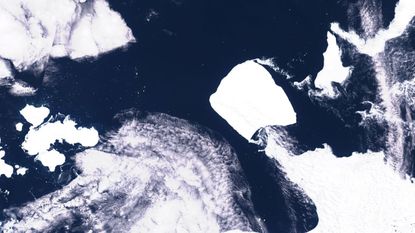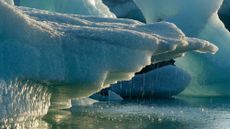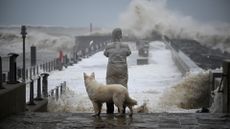A23a: why world's biggest iceberg is on the move
The mass of ice is four times the size of New York and 'essentially' an island

The planet's biggest iceberg is on the move after three decades stuck to the ocean floor.
The uprooting of the colossal chunk of ice, which is slowly moving northward into the Southern Ocean, has been a "long time coming", said Cosmos, but some experts are baffled as to why it is suddenly moving now.
What is it?
Known as A23a, the iceberg split from the Antarctic coastline in 1986 and soon became grounded in the Weddell Sea, "becoming, essentially, an ice island", said the BBC.
Subscribe to The Week
Escape your echo chamber. Get the facts behind the news, plus analysis from multiple perspectives.

Sign up for The Week's Free Newsletters
From our morning news briefing to a weekly Good News Newsletter, get the best of The Week delivered directly to your inbox.
From our morning news briefing to a weekly Good News Newsletter, get the best of The Week delivered directly to your inbox.
At almost 4,000 square km (1,500 square miles) in area, it is more than twice the size of Greater London and more than four times as big as New York. It is a "true colossus", said the broadcaster, and "it's not just its width that impresses" – the iceberg is 400 metres (1,300ft) thick.
While this makes it the "largest iceberg now bobbing in the world's oceans", it is "not the largest on record", said New Scientist. "That behemoth, known as A-76, measured 4320 square km when it broke off from West Antarctica in 2021."
Why is A23a moving now?
"It is not clear why it is making a run for it now," said The Guardian. But British Antarctic Survey glaciologist Oliver Marsh told the paper that "over time, it's probably just thinned slightly and got that little bit of extra buoyancy that's allowed it to lift off the ocean floor and get pushed by ocean currents".
Dr Andrew Fleming, a remote sensing expert from the British Antarctic Survey, told the BBC that he had "asked a couple of colleagues" whether there was "any possible change in shelf water temperatures that might have provoked" the change. But "the consensus is the time had just come", he said.
Cosmos also reported that despite "growing concerns about the behaviour of ice in Antarctica amid record global temperatures", the "escape" of A23a is "not considered climate change related".
However, Chad Greene, from Nasa’s Jet Propulsion Laboratory in California, told New Scientist that icebergs are breaking off Antarctica at a faster rate than snow is adding mass to the ice, "meaning climate change is causing the Antarctic Ice Sheet to lose mass at a significant rate".
What might happen next?
As it "gains steam", the "colossal iceberg will probably be launched into the Antarctic Circumpolar Current", said The Guardian, and "this will funnel it toward the Southern Ocean on a path known as 'iceberg alley' where others of its kind can be found bobbing in dark waters".
But it's possible it could again become grounded at South Georgia island, which would "pose a problem for Antarctica’s wildlife", added the paper, as "millions of seals, penguins, and seabirds breed on the island and forage in the surrounding waters". There is also the danger that it could break apart and create thousands of smaller icebergs that become a danger to ships, as well as blocking access to islands for animals and humans.
It's "not all bad news for nature though", said Cosmos. Within the ice are snap-frozen nutrients, which will be "injected back into the cold Southern Ocean waters as the berg continues its journey north". This development "benefits these complex ecosystems and tiny plankton and other organisms living within them".
Or it could move even further away. An iceberg "of this scale has the potential to survive for quite a long time in the Southern Ocean", said Marsh, "even though it's much warmer, and it could make its way farther north up toward South Africa where it can disrupt shipping".
Meanwhile, scientists can track the iceberg's path using "sophisticated satellite imaging and radar data", said Cosmos, a practice known as remote sensing.

Continue reading for free
We hope you're enjoying The Week's refreshingly open-minded journalism.
Subscribed to The Week? Register your account with the same email as your subscription.
Sign up to our 10 Things You Need to Know Today newsletter
A free daily digest of the biggest news stories of the day - and the best features from our website
Chas Newkey-Burden has been part of The Week Digital team for more than a decade and a journalist for 25 years, starting out on the irreverent football weekly 90 Minutes, before moving to lifestyle magazines Loaded and Attitude. He was a columnist for The Big Issue and landed a world exclusive with David Beckham that became the weekly magazine’s bestselling issue. He now writes regularly for The Guardian, The Telegraph, The Independent, Metro, FourFourTwo and the i new site. He is also the author of a number of non-fiction books.
-
 10 things you need to know today: December 3, 2023
10 things you need to know today: December 3, 2023Daily Briefing Gaza residents flee as Israel continues bombardment, Trump tells supporters to 'guard the vote' in Democratic cities, and more
By Justin Klawans, The Week US Published
-
 5 X-plosive cartoons about Elon Musk
5 X-plosive cartoons about Elon MuskCartoons Artists take on his proposed clean-up of X, his views on advertisers, and more
By The Week US Published
-
 2023: the year of superhero fatigue
2023: the year of superhero fatigueThe Explainer The year may represent the end of an era for Hollywood
By Brendan Morrow, The Week US Published
-
 Places that will become climate refuges
Places that will become climate refugesThe Explainer The Midwest may become the new hotspot to move
By Devika Rao, The Week US Published
-
 Cop28: is UAE the right host for the climate summit?
Cop28: is UAE the right host for the climate summit?Today's Big Question Middle East nation is accused of 'pushing for a green world that can still have its oil'
By Chas Newkey-Burden, The Week UK Published
-
 Scientists have their eyes on 2 supervolcanoes
Scientists have their eyes on 2 supervolcanoesThe Explainer 'The probability of a catastrophic eruption is low but not nil'
By Devika Rao, The Week US Published
-
 Want to understand climate change? Look to the clouds.
Want to understand climate change? Look to the clouds.The Explainer Scientists are still uncovering the role clouds play in climate change
By Devika Rao, The Week US Published
-
 6 looming climate tipping points that imperil our planet
6 looming climate tipping points that imperil our planetThe Explainer A UN report details the thresholds we may be close to crossing
By Devika Rao, The Week US Published
-
 'Danger to life' warning as Storm Ciarán hits UK shores
'Danger to life' warning as Storm Ciarán hits UK shoresSpeed Read Schools closed and train, plane and car travel disrupted as Met Office issues weather warnings
By The Week UK Published
-
 The drying Amazon rainforest: a drought that affects the world
The drying Amazon rainforest: a drought that affects the worldUnder the radar The Amazon is suffering a drought of historic severity and it’s pushing its inhabitants to their limit
By The Week UK Published
-
 Under Antarctic ice lies a hidden landscape
Under Antarctic ice lies a hidden landscapeSpeed Read Climate change may reveal it over time
By Devika Rao, The Week US Published










